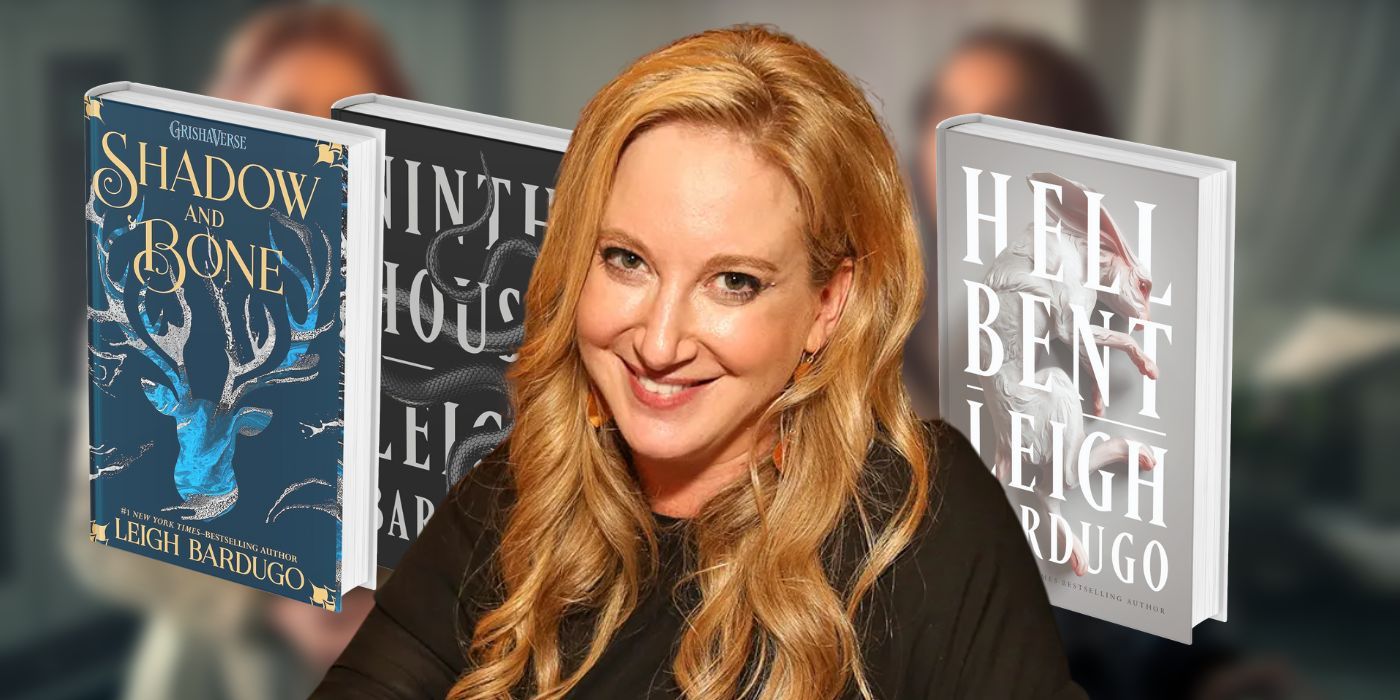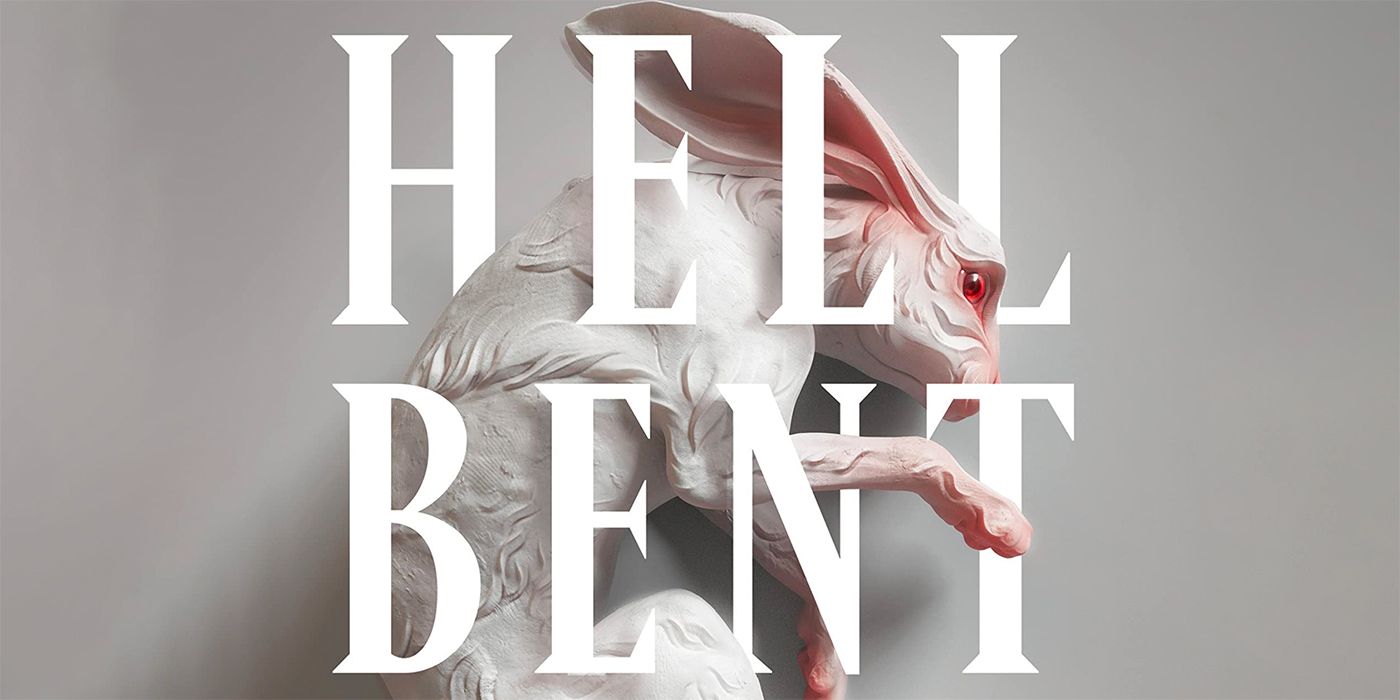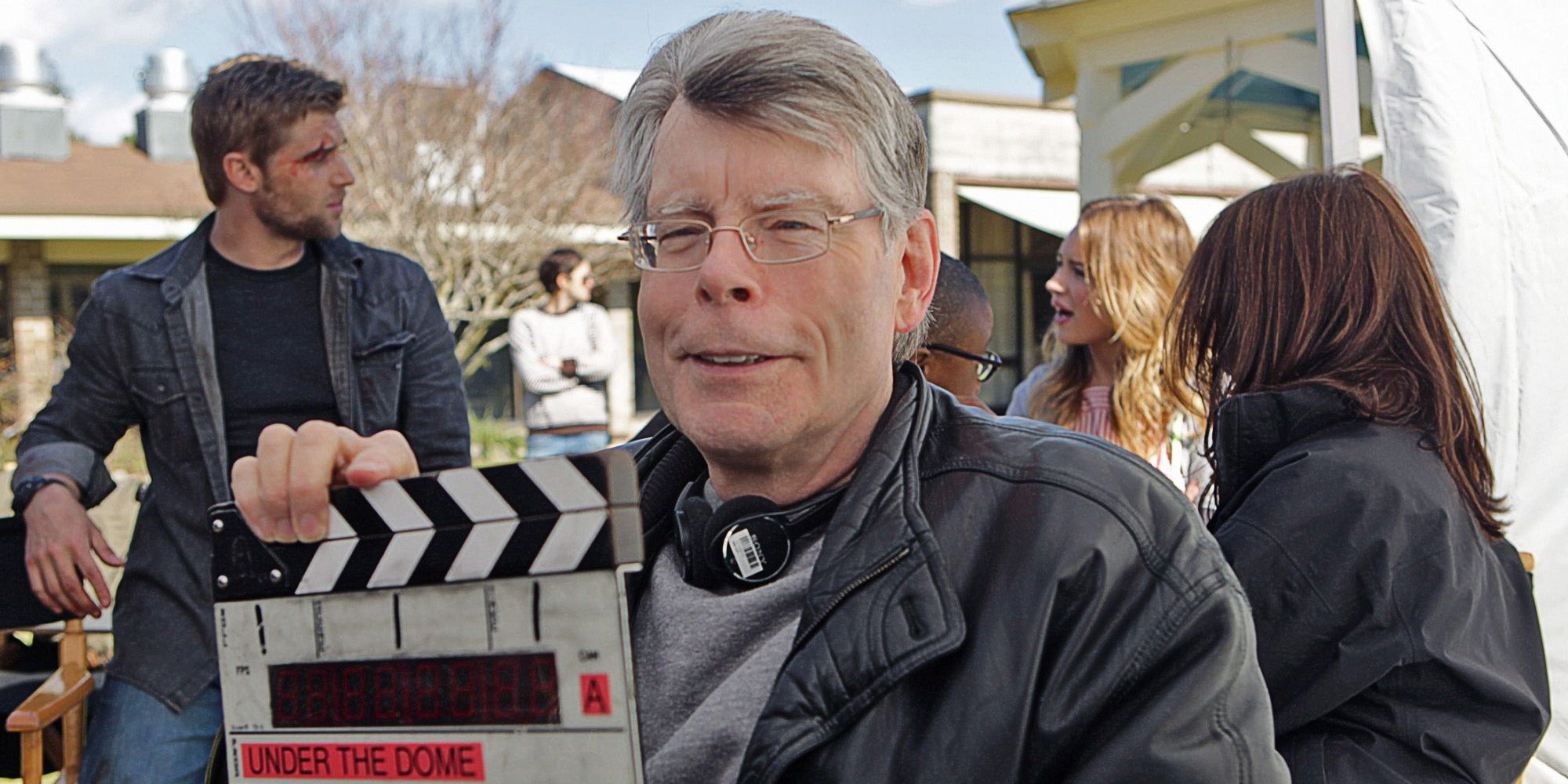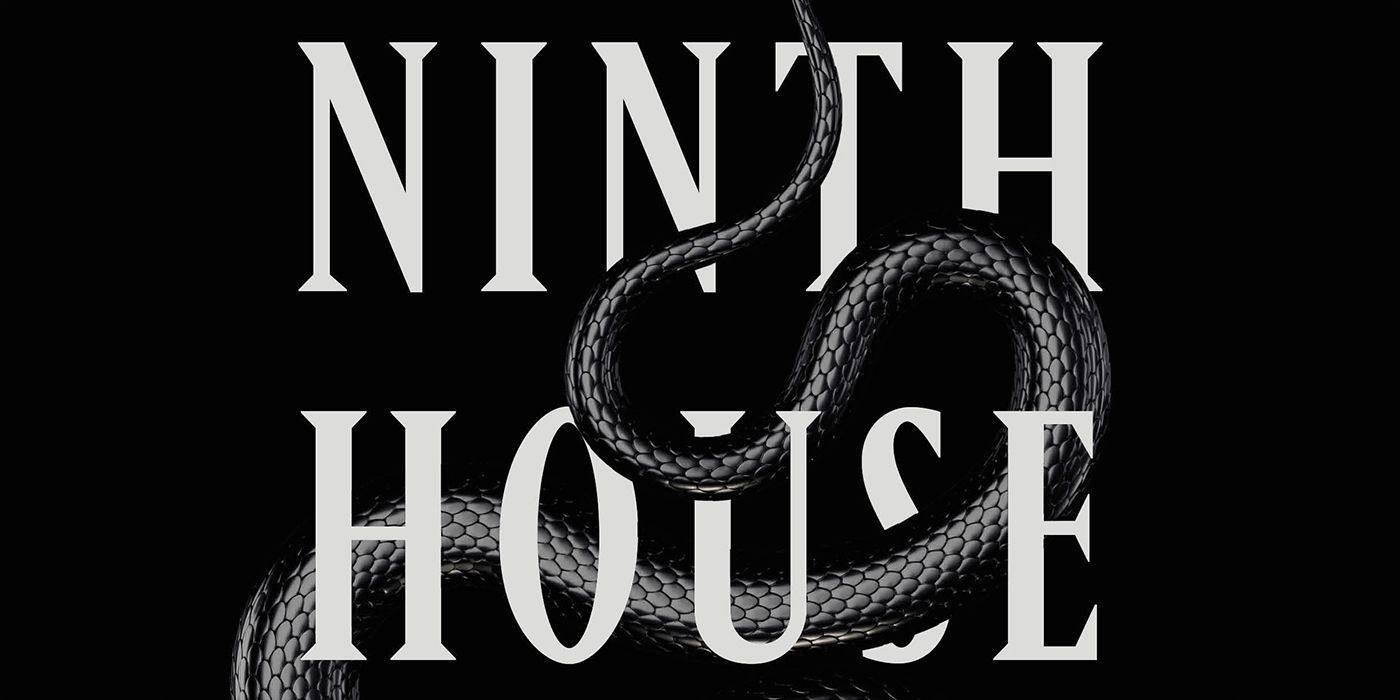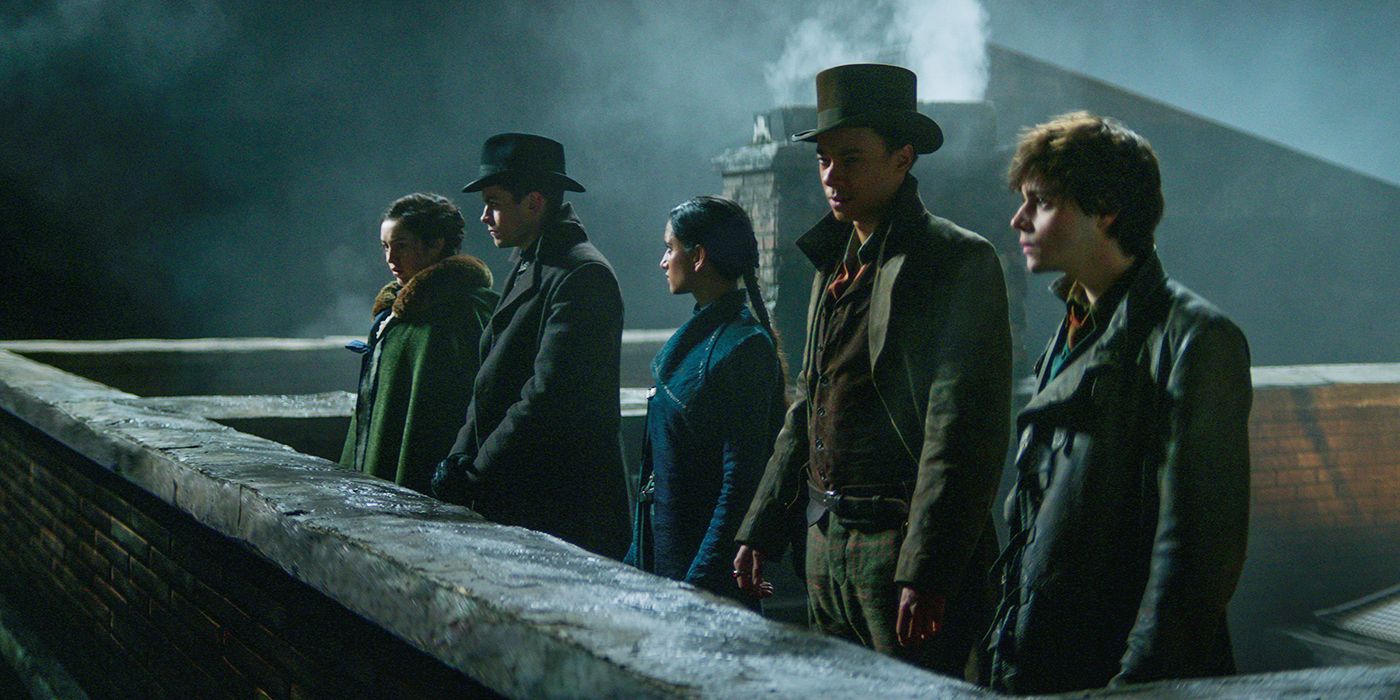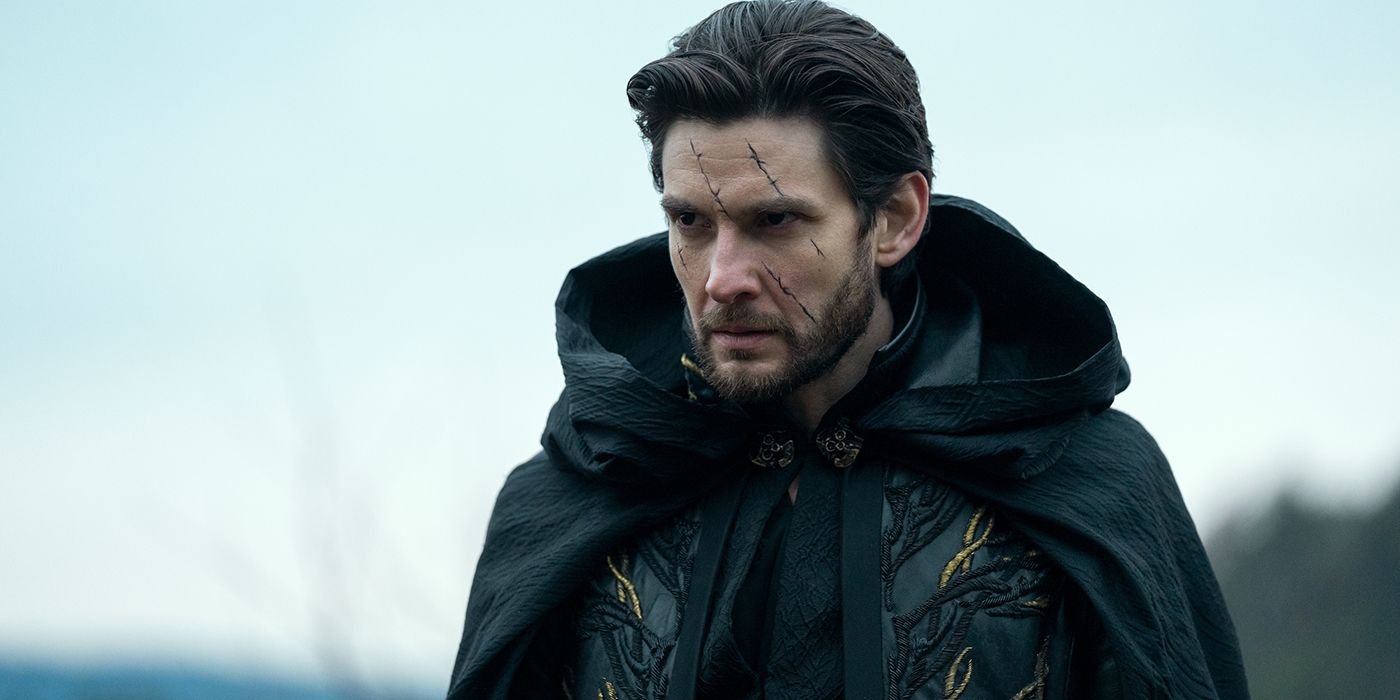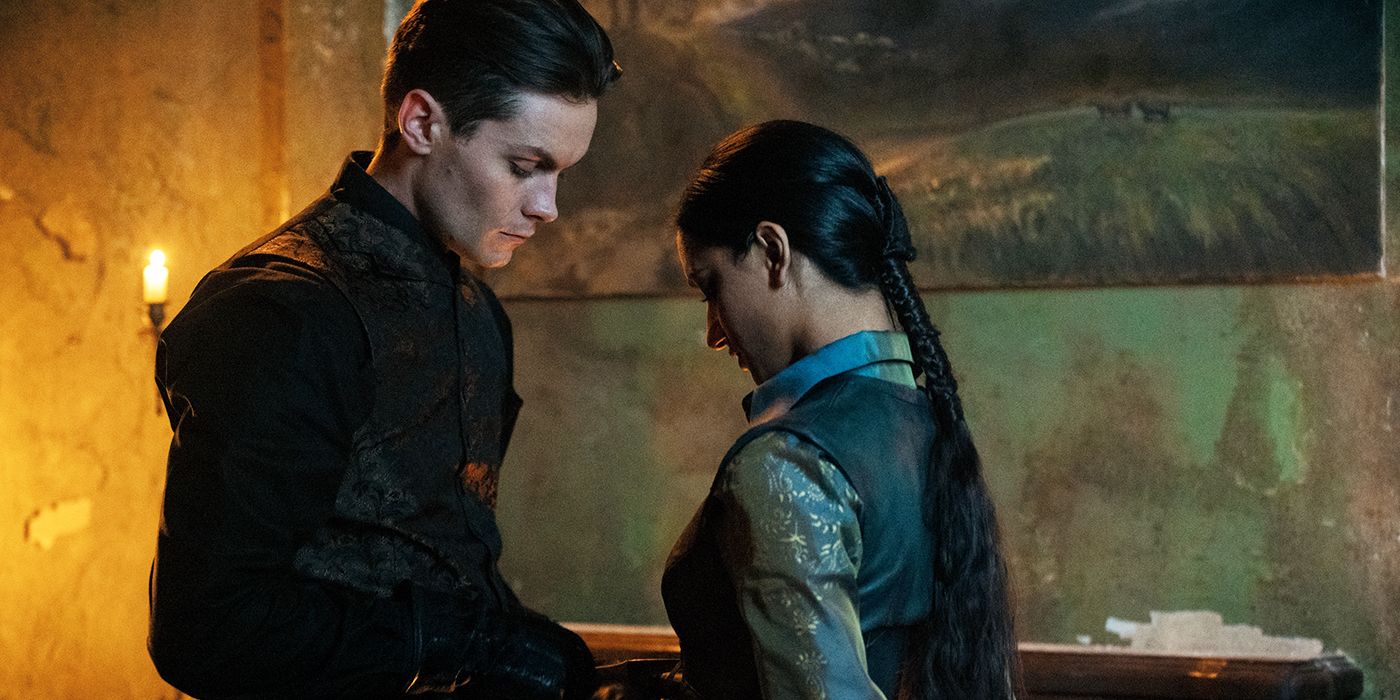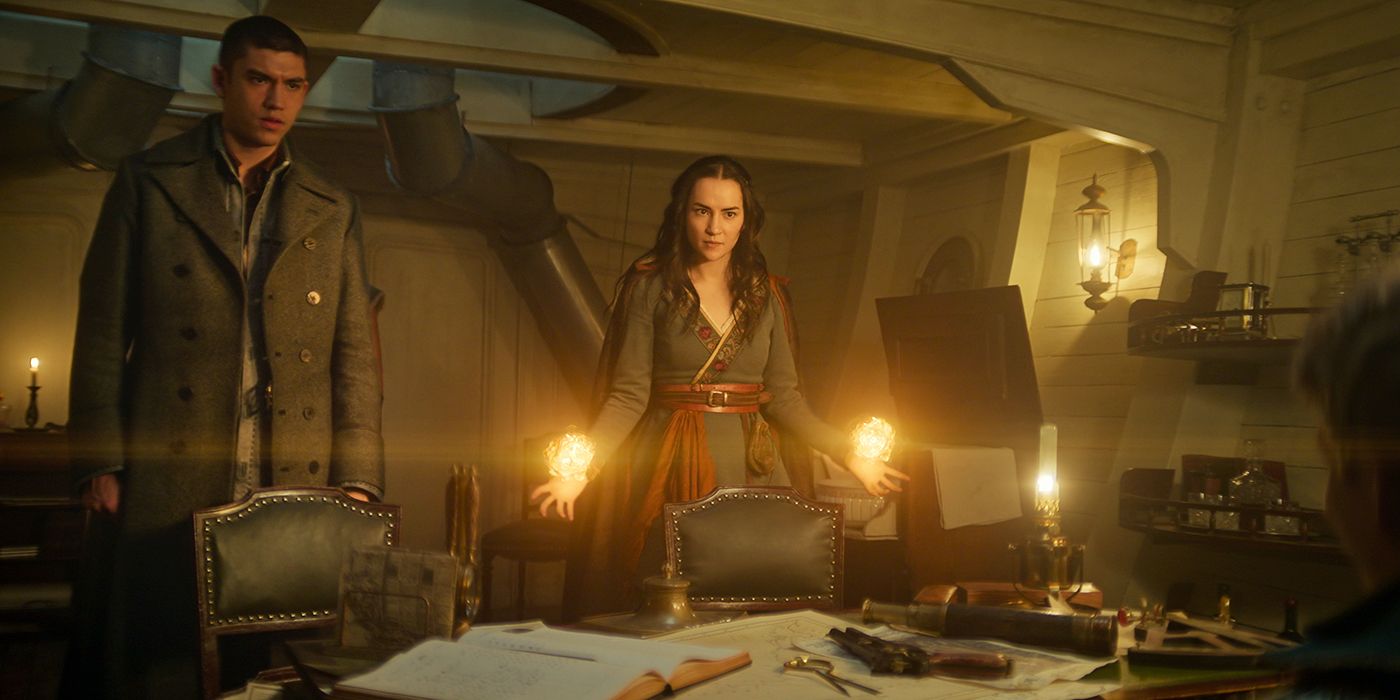Leigh Bardugo has a lot in the works right now. From the upcoming second season of Shadow and Bone set to premiere on Netflix on March 16, to her new book in the Alex Stern series Hell Bent, to working on the Ninth House television adaptation from Amazon Studios, there's a lot to look forward to. Not to mention the projects that have yet to be released. We spoke with Bardugo about these projects recently and asked her our burning questions about her book series and the television shows that spun out from them.
Her Grishaverse novels, comprised of seven primary books with multiple short stories attached, is beloved by readers. It follows a magical girl named Alina Starkov (played by Jessie Mei Li in the Netflix series) who has the rare power to summon light in a world full of magical people called Grisha. She is pulled into the political machinations and war after her ability is discovered by The Darkling (played by Ben Barnes in the Netflix series). From there the stories spin-off to stories about a group of thieves who take part in a magical heist and a story about the prince of the kingdom in the aftermath of a war. This series was brought to life in April 2021, with Netflix releasing an eight-episode season that had fans excited for more from the universe.
Conversely, her Alex Stern novels are paranormal adult fiction. The story follows a Freshman named Alex Stern, a new student at the prestigious Yale University. While she stands out an as an outsider among the wealthy elite, she has a special power: the power to see ghosts. She enters into a world of dark academia, full of secret societies and the occult. Her first book Ninth House follows Alex's first year at Yale and learning to understand her abilities, while the second, Hell Bent, follows her as she attempts to rescue one of her friends from hell.
With Bardugo, we discussed the romantic relationship between Darlington and Alex in the Alex Stern novels, how she reacted to Stephen King's glowing review of Ninth House, where a third Six of Crows book could entail, how she was inspired by George Clooney and Monuments Men, and where the progress is on the Ninth House television adaptation. Read the full transcript below, the interview contains spoilers for Hell Bent and Crooked Kingdom.
COLLIDER: I'm really excited to speak with you about Hell Bent, and Ninth House, and we're going to go into a lot of your other projects. But first off, I just want to know, so Ninth House famously got this very shining endorsement from Stephen King, which I can imagine was both amazing feedback to get and also kind of intimidating. Did that get into your head at any point when you were writing Hell Bent, where you're like, "Okay, will this—"
LEIGH BARDUGO: "Man, I hope Stephen King likes this." No, because look, I got the news of the Stephen King blurb when I was in Boston. I was actually there to do an event. And I was in my hotel room and I will never forget that. I mean, I got the email, and I was reading it on my phone. I literally lay in bed like this, and my husband was like, "What is happening? Are you okay? What action do I need to take in this moment?" I was like, "Ugh." It was very strange and very emotional, because I think Stephen King is one of the big reasons I'm a writer, and particularly why I write genre, and probably a big influence on why there's a lot of horror in quite a bit of my books. But in terms of writing Hell Bent, if I thought Stephen King was looking over my shoulder, the book never would've gotten done.
In the same way that I think in order for us to write, we really need to practice shutting out everything and everybody and forgetting, honestly, on some level that anybody's ever going to read the book. It has to just be you and the characters for a while when you're drafting. When you're revising, then you can start to think about, wow, does this make sense? And am I really succeeding in bringing my audience along with me? And are these emotions going to feel earned? Are these characters going to feel real? But in the drafting phase, at least, I try to pretend that no one's ever going to read the book.
COLLIDER: I think that's a great way to move forward. Otherwise, you're going to be trapped in your mind for the entire time.
BARDUGO: But I do love the vision of Stephen King just like-
COLLIDER: Waiting.
BARDUGO: "I'm standing behind you."
COLLIDER: He's just sitting in the shadows, sipping a cup of coffee, just watching.
BARDUGO: Lurking.
COLLIDER: So the Alex Stern series is very firmly placed in adult fiction. It's genre fiction, but it's definitely for an adult audience. And obviously a lot of your readers came over from the Grishaverse, which is more geared towards young adults. I'm curious to hear your take on books requiring or having some sort of a trigger warning before their books, because I've seen people have that conversation a lot with your books.
BARDUGO: There was a real big dust up before Ninth House came out about whether it should have trigger warnings on it. And I have really two feelings about that. My feeling at the time was, if you're going to put trigger warnings on my book, then they need to be on every book. Because I think it's very interesting the kind of books that people call for trigger or content warnings on and the books that they seem to give a pass. And I do feel that that is sometimes a gendered conversation. I have literally never seen somebody call for a trigger warning on a Stephen King book, for instance.
COLLIDER: Well, I was going to say, some of his books really do get into some adult subjects.
BARDUGO: I really was thinking about this and the validity of this, but if you research trigger warnings, even the most cursory research will show you that they don't work. That in fact, trigger warnings are more likely to be damaging to people with PTSD and trauma. And once you know that, you have to start questioning what people are calling for when they call for trigger warnings. If there are things in books that make you uncomfortable, that's fine. You should absolutely, I think, have resources available to you where you can find the things that make you uncomfortable.
But that is very different from being triggered or being thrown into a state of having to deal with past trauma. And I don't like the idea that we're conflating discomfort, which I think is actually an essential part of reading, particularly if you seek out books that are dark fantasy, dark academia horror. That discomfort should be a part of that reading process, or you should understand that that can be a part of that reading process. That to me, is very different from talking about an actual trigger.
COLLIDER: I totally agree with you. I mean, I think there were some scenes when I was first reading Ninth House that caught me quite by surprise. But I feel like if they had been, I don't know if sanitized is the right word, but if they'd kind of been dialed back, I think it would've taken away from the exploration of the character. It was a little traumatizing to read, but not in a permanent way in any fashion.
BARDUGO: I think we have to be careful about the language surrounding this because I'm certainly not looking to traumatize people who were just looking for a good time. That is not my mission as an author.
COLLIDER: Shock is maybe the better word for it.
BARDUGO: I think there's been an increase in the way that people read, where there's almost a... It's as if they're filling out a menu. I want this trope and this trope, and I want this amount of spice and I want this kind of... And I'm going to put this order in and I'm going to get exactly what I want back. And again, if that is the reading experience you want, there are a lot of ways to have that reading experience. But that is not what I'm personally seeking out, and that's not necessarily the reader that I'm writing for. I've also found that when it comes to real triggers and real trauma, as somebody who's a survivor of sexual assault and has a pretty... I think I have a pretty good handle on the things that are difficult for me at my ripe old age. I treat that like a peanut allergy.
I treat that as this is not, "Oh geez, that made me feel bad. This could actually do damage to me," and I treat my mental health the way I would treat my physical health. And so if I'm concerned about something, I will go look, I will go seek out reviews that will talk about those things, or I will go read about the book and try to get a sense of what that might be for me. But my experience has been that the majority of readers have a sense of what's coming and will absolutely nope out of a book if they feel like it is not the right tone for them. And I think Ninth House establishes very early on what kind of book it is. I mean, it opens with a scene of a man having his insides moved around so that people can predict the stock market.
And to be completely honest, if you were going to make a full trigger warning list or content warning list for this book, you would need one almost on every page. At the same time, I've had people come to me and be like, "I thought this book was going to be so dark and so intense, but it's kind of not." I'm like, "Yeah. It depends what you're bringing to it." And I thought it was fun. I thought it had a lot of good jokes. But I understand that some people may not feel that way. So I'm not going to sit here and make prescriptions about trigger warnings or content warnings, I'll just say, if this becomes something that publishing does, it has to be on every single book. And I would be curious to know which things made it through that process, and which got flagged and which didn't, I think would be pretty interesting.
COLLIDER: Yes, definitely, I agree with you on that. Going back to Hell Bent, I have to ask about Alex and Darlington's relationship. The two of them have kind of been dancing around their feelings for each other and there's passing romatic thoughts in each of their minds. But has it always been your intention to eventually see them in this sort of connected relationship with each other, or is that wishful thinking on my behalf?
BARDUGO: I mean, if you've read any of my books, you probably know that I-
COLLIDER: I've read all of them.
BARDUGO: Then you know I don't just like a slow burn, I like a slow, excruciating burn. That's what I love in books. That's what I love in film. I want my readers to be screaming for it to happen before it happens. And that is always my instinct, is to play with... I like to create characters who just can't quite get over their shit. And that is very much what Alex is like, what Darlington is like. And as far as where their romance may or may not go, you're going to have to wait for the third book.
COLLIDER: I knew that answer was coming. But I've lived through a major character death in Six of Crows. I think I can live through anything at this point.
BARDUGO: But that's what I love about that, is that at this point people are like, "She could do anything at any time." And it's like, that's what I want. I never want my readers to feel like, "She won't do it." If the gun is on the mantle, it's going to go off at some point. Who that bullet is going to hit, you're never going to know until it happens. But for me, it's also that I don't feel like a book should just... I feel like there's a role for a cozy read, a comfort read. But for me, my comfort reads growing up were Stephen King, Clive Barker. For whatever reason, that for me was where my comfort was. And I guess maybe I'm writing for those weirdos.
COLLIDER: I love that, and I love all the tragedy. I love to feel pain when I'm reading. So obviously there's a third Alex Stern in the works, and I'm guessing that it could be an ending for Alex's story. But considering that your Grishaverse novels had spinoffs with the Crows and with Nikolai, is there a character or story that you've been kind of percolating in your mind in this universe that you would like to explore?
BARDUGO: That is an interesting question. To me, this world, and I think particularly in the third book because we are going to spend some time outside of New Haven in that book. And if you have read Hell Bent carefully, you will see some indications of some of the places we may be going. But to me, yes, there are characters and there are also themes and organizations that are of interest to me that exist in this wider world of magic. But I'll just have to see. I have always had a policy in my writing life, I have never been one of those people who's like, "I'm going to sell 22 books to this publisher," because I don't want to be locked in. I want to have the flexibility to write what I want, when I want to write it.
And that, I think, is a tremendous luxury. That is a huge privilege and is really the result of my readers being kind enough to follow me to these different places. So I would say, never say never, but right now I have plans for different projects that are where I want to head. That said, when I finished the Shadow and Bone Trilogy, I had no intention of writing in the Grishaverse for a few years. I had other things I was going to write, I thought I would pick up Nikolai's story, and then I got the idea for Six of Crows.
COLLIDER: Thank god you did.
BARDUGO: I mean, honestly, yeah. It definitely changed the course of my publishing trajectory. So for that book and for that idea. And honestly, for George Clooney for making Monuments Men, because that was the billboard that sparked the whole idea. I've never seen it and probably never will.
COLLIDER: That connection feels very tangential, but I'm glad that that happened!
BARDUGO: I was driving down the street in Los Angeles, I saw a billboard for Monuments Men. I was like, I have no interest in seeing that, but boy, I would really like to watch Oceans 11 again. And I thought, oh my God, I want to write a magical heist. That is the genesis of Six of Crows. So thank you, George Clooney and Matt Damon, for that and nothing else.
COLLIDER: Indeed. Switching gears again, much like Shadow and Bone, Ninth House is going to get a TV adaptation, and I'm very excited for this. Obviously, you are also an executive producer on that. I'm curious, is there anything you can tell me about the process right now as far as how far you guys are along? Is there any writing done? Is there casting, any showrunners?
BARDUGO: All I can tell you is the wheels, as you know if you report on television, the wheels of Hollywood turn very slowly. And I can't even talk about who I've been working on the project with. But I can tell you that we have a pilot that I absolutely love and that it has been a complete delight to work on. Unlike with Shadow and Bone, I actually got to get in there and work on the writing, break the story, deal with notes in a much more hands-on way.
And I loved it. And I also feel like it made me twice as excited to write Hell Bent, because it made me think of the story in different ways. And that, I think, is a pleasure. I think it's very easy to get locked in because writing is so solitary. You said you're a writer too. You get locked into this solitude and this space, and you forget that this is supposed to be fun. And this really renewed my feeling of excitement about this series.
COLLIDER: Amazing. Well, I'm glad that you got to do some writing too. I feel like your writing is very cinematic already in nature, so it lends itself well. I did feel that way when I was reading Ninth House. I was like, "Oh, this will be a great TV show. I can visualize all these scenes perfectly."
BARDUGO: I mean, since you've read my books you know. If I could, I would just write banter. It would just be banter, like 300 pages of banter.
COLLIDER: And I would love that. So I can't not ask you about Shadow and Bone Season 2 since we're talking about adapting your work. I know there's limited amounts of things that you can tell me. I have seen some of the episodes so far. In this season, I feel like there's a lot of stuff to cover. You've got two books from the trilogy and you have the Crows involved. Is it difficult to thread that needle and try and stitch everything together into a story that is cohesive?
BARDUGO: I mean, the beauty of it is I don't have to thread that needle. I made a deal with myself that if we got a second season, I was going to take a step back from the adaptation process and be a little bit less hands-on. And I think that that is not only something I did because I needed to get back to writing books and I simply did not have the time. There's an amount of decision fatigue that sets in when you're working on production and post and all of it that for me, really impacted my ability to write novels. So that was part of it. But another part of it was saying, look, y'all made your bones. You proved yourselves. You have created this thing that has its own life. These actors have brought their own talent and identity to these characters, and it's time for this to live separately from the books.
And I think if I had tried to keep a grip on it, it simply wouldn't have worked. So to me, it was about letting the show be its own thing and then letting them try to work out the logistics of how these stories and worlds and characters were going to bump into each other again, really crash into each other again. And I think you don't get the full sense from those first episodes of the way that the story... much as in the same way as Season 1. You don't get the full sense of how these stories are going to intersect until the middle of the season. But I think that the writers, I think they took the foundation they built in Season 1, and they really let themselves go wild with it. And I always like that. I respect that.
COLLIDER: I'm interested to see where it all goes, it feels like it could lead anywhere at this point.
BARDUGO: It will go everywhere.
COLLIDER: And just speaking about the Grishaverse books and that whole universe, you said you wanted to get back into writing — I have heard whispers and teases of a third Crows book. Have you solidified any of those plans?
BARDUGO: For me, a third Six of Crows is a big 'someday'. I have an idea for the plot of it, and I've had it for a long time. And when I wrote Rule of Wolves, I had every intention of writing that third book. But for me, the Grishaverse has gotten a little crowded at this point and a little noisy. And there are other projects that I want to work on. And for me, I don't want to write that book with those characters until I really want to do it. I don't want it to be because I need to redo my kitchen. I want it to be something that my heart actually speaks to and that I'm ready to do. Because they mean a great deal to me, and I know that they matter to a lot of readers. So that's a maybe. It's a big, maybe. Yeah.
COLLIDER: As much as I love that series, I think that just means Kaz gets to stay alive longer in my brain, so I'm okay with that. I will read the book one day when you write it, but I see the writing on the wall.
BARDUGO: That's the thing, right? If there's a third Six of Crows, it's not like they're just going to sit around and have delightful conversations.
COLLIDER: Someone has to die.
BARDUGO: Bad shit will happen, that's the nature of writing conflict. So, we'll see. Right now there are a lot of other things on deck. And there's actually a few places in the Grishaverse that I'm going to get to explore in a sort of different format and way that I can't talk about yet but that I'm excited about because it's going to involve a different kind of collaboration. And for me, right now, that's where I want to... When it comes to working in that world, I want the opportunity to throw some more doors open before I come back to those characters and that story.
COLLIDER: I really like the graphic novel that you put out for Demon in the Wood. I'm also excited for any new stories that you have in mind. But, okay, final question: when I'm reading Ninth House, and when I was reading Hell Bent especially, I was like, "This was not a great look for Yale." Obviously, it's fiction. I don't think they're conducting these rituals. Who knows? I mean, they might be. (Just kidding.) But what's the word from Yale?
BARDUGO: Okay. So when I wrote that first book, I thought, what's about to go down? Am I going to be disavowed? Is it going to be like-
COLLIDER: Well, you were in one of those secret societies, right?
BARDUGO: I was. Are they going to be like, "Nope, you can't come back here," like I step foot on campus and all of a sudden there's a special ops team there to remove me. But in fact, people there seem to really love it. I mean, I can't speak for the members of Skull and Bones. I have no insight into that. But my society had me back. They hosted me, and it was actually wonderful because I got to meet the new delegation and they are just a delightful group of humans. Not shapeshifters, as far as I know. And I was able to go back and do a second research trip, which was very necessary for Hell Bent.
COLLIDER: Yes, I saw that at the end of your acknowledgements, so I was going to ask you about that.
BARDUGO: Yes. That was a real nick of time thing because of the COVID situation. But all of the feedback I've gotten from people who went to Yale, from people who live in New Haven or Connecticut, particularly some of the wonderful people who helped me with some of the research in the libraries and museums, actually seemed to like it a lot. And I think they took it in the spirit in which it is intended, which is that there is a lot of darkness and sadness and corruption in these books, but there's also a lot of joy and wish fulfillment. If there's no pleasure in it, if there's no lure, then what's the point of being there in the first place? Then why wouldn't Alex turn her back on it right away? So for me, I loved my time at Yale, but I also wanted to excavate it honestly.
And that's what these books are. They are fiction and fantasy, but they're also a way for me to treat honestly with a time in my life that maybe needed a little more examination than I realized. And with the fact of what these institutions, these elite institutions represent, and the kind of power that they wield, particularly in a city like New Haven, which New Haven has become a place of tremendous enchantment and love for me because of the research that I did into these books.
And it's not something I'm proud of, but certainly when I was at school there, I didn't have a real understanding of the city or the people in it. I lived behind those walls without really acknowledging our responsibility to the place where we worked and where we were going to class every day. So for me, that was the true discovery of these stories. And one of my great joys is thinking about people actually visiting New Haven and walking around and eating in the restaurants and seeing these places that mean so much to me now.
COLLIDER: When I was reading those books, I felt like this is the perfect description of New Haven. With the combination of the affluent parts of Yale and then the more working-class town itself.
BARDUGO: I grew up in Los Angeles, which is similar to New Haven in the sense that it's not as if an alarm goes off and suddenly you're like, "You're in a different neighborhood." That's not the way it works. You need to know it. You need to know it. You need to get to know the city. And I think that that's one of the challenges of New Haven. But I think once you do begin to know it... I have tried again to treat honestly with some of the problems that are facing New Haven and the ways that Yale is complicit in those problems, if not the source of some of those problems. It is a major employer, but it is also eating up buildings that then deny the city tax revenue. There are big complex issues that face this city. But to me that is part of the pleasure of reading, is making people reckon with places and dynamics that maybe they weren't even aware of, and again, that I wasn't aware of until I really started digging.
And I say this, I lived in New Haven. When I wrote for The Advocate I lived in New Haven after I graduated. And I began to know the city and the people who lived in it but I never really pursued it, I think, in the way that I did when I started digging into these books. And that wasn't the book I set out to write. I thought I was writing kind of a magical romp set at Yale. Well, surprise, surprise. Sometimes the story decides it's going to take you someplace different.
COLLIDER: Well, I'm glad it took you to that place because I really enjoyed the series. And thank you for not killing Tripp because he was the himbo of my heart in that book. I was very worried he was going to get written off at some point.
BARDUGO: I really loved writing Tripp. I did not expect to love writing Tripp, and boy did I love writing Tripp. And he was just so much fun. And it has been really fun to see people be like, "I don't believe I care about this jackass."
COLLIDER: Tripp is amazing. I got very attached to him during this book, I was devastated that he might die.
BARDUGO: Oh, Tripp. Sweet Tripp. Yeah. I know a lot of Tripps. I think we all do. I think we've all met a few Tripp in our life.
COLLIDER: I like that he's kind of like that douchebag, but he's not really mean. He's just a child of privilege and also simple-minded.
BARDUGO: I think Tripp is doing his best. That doesn't mean his best is good enough, but he's actually trying to do his best. And he even says at one point, "I want to be one of the good guys." And honestly, I think that's a really lovely quality and not something that everybody has. So I really loved writing him and I loved his dynamic with all of the other characters. And I also love... Now I just sound like a jerk being like, "Let me tell you about all the things I love in my own book." But he was fun. And for me, especially in these books where there is a lot of darkness and difficulty, I think the characters like that, that element of fun is so important. And they're definitely the people who kind of walk with me through the dark.
COLLIDER: Yeah, he's a beautiful golden retriever, and we love him. And sometimes he sheds all over the place, but we accept him for who he is.
BARDUGO: He's going to lick your face. You're gonna be a little grossed out, but you're going to know his heart is in the right place.
COLLIDER: For sure. Well, thank you so much for speaking with me. Can't wait for everything you have coming down the pipeline.
BARDUGO: Thank you so much.

